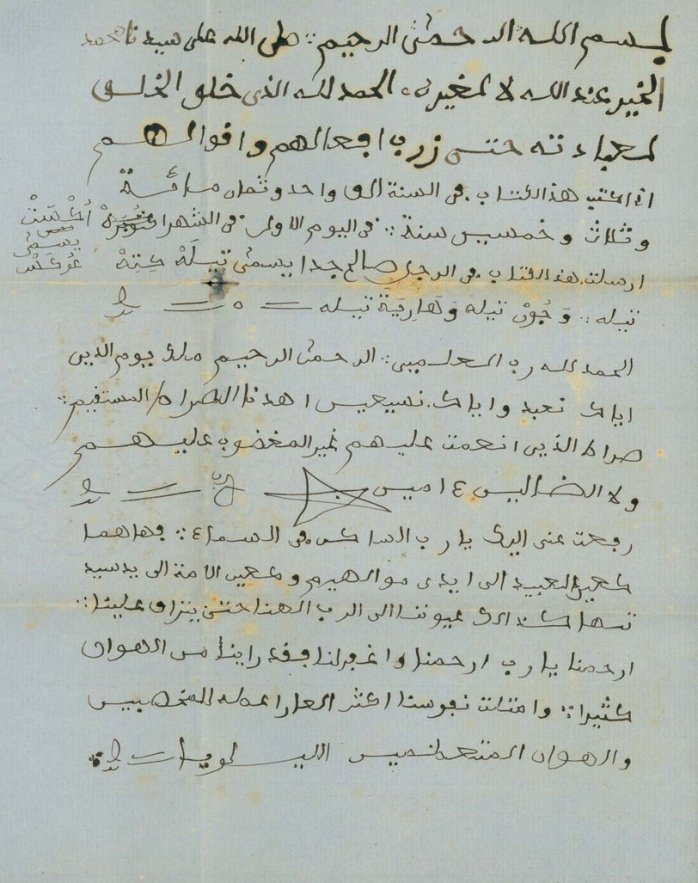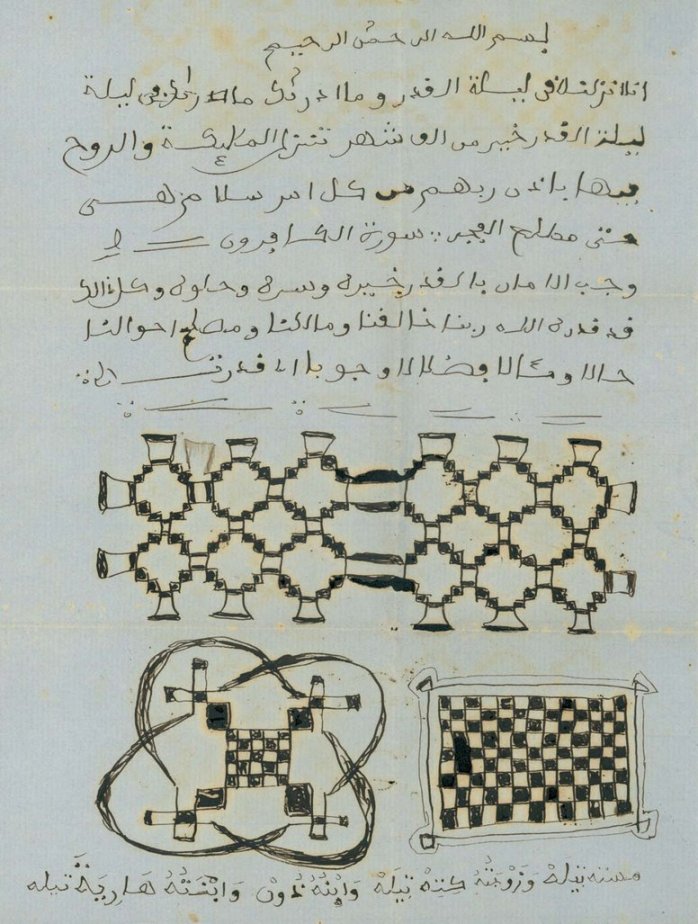Spartanburg Manuscript
‘Umar ibn Sayyid's Letter to John Taylor (1853)
Spartanburg County Historical Association Manuscript
Translation and Introduction, Jeffrey Einboden (Northern Illinois University)
During my research trip to North Carolina (June-July, 2011), archives at the UNC Chapel Hill led me to a yet unpublished Ibn Sayyid manuscript currently housed at the Spartanburg County Historical Association (South Carolina).
Including both a dedication and a date, the provenance of this manuscript is partially revealed in its very text, clarifying the period, place and person of its composition. Addressed to a “John Taylor”, the letter mentions also the name of John’s wife (“Kitty”), his son (“John [Jr.]”), and his daughter (“Harriett”) – a family outline enabling us to identify the addressee more specifically as John Allan Taylor (1798-1873), fellow resident of Wilmington, North Carolina, and congregant of Wilmington First Presbyterian, the church attended by Ibn Sayyid.
If the external history of this manuscript may be traced across domestic and familial borders, the letter’s internal text straddles boundaries which are more global and ancient, spanning Islam and Christianity, the Qur’ān and the Bible, West Africa and the American South. This straddling is implied from the very opening of Ibn Sayyid’s letter; however, it also amplifies as the letter unfolds, building a cross-cultural narrative that develops from the top of its Page Right, to the bottom of Page Left. In my reading of the manuscript, the following discrete sections are discernable:
- Section A: Benediction “In the name of God…” (Page Right; Lines 1-3)
- Section B: Introduction “Verily I write this document…” (Page Right: Lines 4-7)
- Section C: Ṣūrat al-Fātiḥah “Praise be to God…” (Page Right: Lines 8-11)
- Section D: Psalm 123 “I lift up my eyes to you, O Lord…” (Page Right: Lines 8-11)
- Section E: Ṣūrat al-Qadr “Verily, We sent it down…” (Page Left: Lines 1-5)
- Section F: God’s Decree “Obligatory is belief in the Decree…” (Page Left: Lines 6-8)
- Section G: Addressees “Mister Taylor…” (Page Left: Line 9)
With generous permission from the Spartanburg County Historical Association, I include below a reproduction of the manuscript itself, followed by my own English translation, ordered line by line, and calibrated to Ibn Sayyid’s Arabic original. Included together with Spartanburg’s materials was a much earlier translation of the manuscript produced by Dr. Peter Ashy; although my translation diverges significantly from his initial rendition, I gratefully acknowledge Dr. Ashy’s previous efforts.
Page Right

[1] In the name of God, the Merciful, the Compassionate. May God bless our liege-lord Muhammad.
[2] Goodness is from God, and belongs to none other than Him. Praise be to God, who created the creatures
[3] for His worship, so that He may test their actions and their words. (Note 1)
[4] Verily I write this document in the year eighteen hundred
[5] and fifty-three, on the first day in the month of [October (excised)] August [two alternate spellings].
[6] I sent this document with the man, extremely upright, named Taylor; Kitty
[7] Taylor, and John Taylor, and Harriett Taylor. [Lines, Circle & Loop]
[8] Praise be to God, the Lord of the Worlds, the Merciful, the Compassionate, Master of the Day of Judgment
[9] You we worship, and You we ask for aid. Guide us on the straight path.
[10] The path of those whom You have blessed, not of those who have received your wrath,
[11] nor those who are astray. Amen. [Star, Loops & Lines]
[12] I lift up my eyes to you, O Lord, who dwell in the heavens. And behold,
[13] as the eyes of the slaves to the hands of their masters, and as the eye of the maid to the hand of
[14] her mistress, thus are our eyes to the Lord our God, until He is beneficent to us.
[15] Have mercy on us, Lord, have mercy on us, and pardon us. For verily we have seen much disgrace.
[16] And our souls are filled greatly. Give reproach to those who are at ease,
[17] and disgrace to the proud. Hallelujah. (Note 2) [Lines & Loop]
Page Left

[1] In the name of God, the Merciful, the Compassionate.
[2] Verily We sent it down during the Night of Decree. And what will make you comprehend what the [illegible & excised] Night is?
[3] The Night of Decree is better than a thousand months. The angels and the spirit descend
[4] during it by the permission of their Lord from every command. It is peace,
[5] until the rise of dawn. [Dots] The Chapter of the Disbelievers. [Lines & Loop]
[6] Obligatory is belief in the Decree, its good, and its evil, and its sweetness, and all of this
[7] has God decreed, our Lord, our Creator, our Master, the benefactor of our states,
[8] position and property, gracefully not compulsorily, i.e. His omnipotence.
[Lines & Large Geometric Sketches]
[9] Mister Taylor, and his wife, Kitty Taylor, and his son, John, and his daughter, Harriett Taylor.
Notes
Note 1. These phrases, comprising lines 2-3 of Page Right, appear in multiple Ibn Sayyid manuscripts. See, for example, Ibn Sayyid’s Taylor-Key letter as translated by John Hunwick in his 2003 article “‘I wish to be seen in our land called Āfrikā’ ‘Umar B. Sayyid’s Appeal to be Released from Slavery (1819)” Journal of Arabic & Islamic Studies 5 (2003): 62-77 (74). In this essay, Professor Hunwick provides a numbered, line-by-line translation of his 1819 source – a structure that I adopt here in translating this 1853 letter.
Note 2. This Arabic version of Psalm 123 derives from an 1811 Arabic Bible owned and annotated by Ibn Sayyid, now housed at Davidson College.
- Arabic Slave Writings and the American Canon